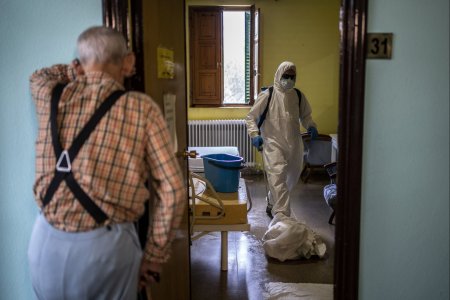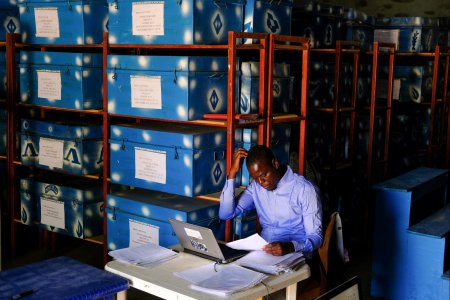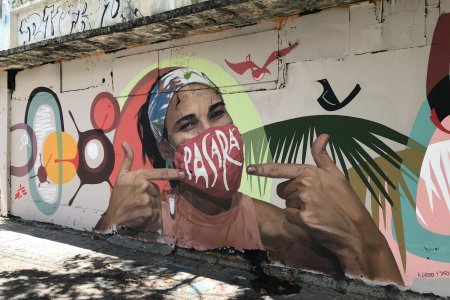
Covid-19: reactions of sociologists in lockdown
Marc Le Pape
In France, from March onwards, many sociologists regularly appear in the media. Based on this observation, Marc Le Pape analysed 37 articles written during the containment period, dealing with the Covid-19 pandemic.
Sociologists becoming HSS-emergency workersHSS: Human and Social Sciences, of which sociology is a part.? This is what started happening in France in March 2020, so I analysed thirty-seven articles they wrote on the Covid-19 pandemic during the lockdownOf the 37 articles, five deal with China, one with India, and two with the United States. These will be discussed in a future blog post.. Prior to March 2020, many of these researchers had done studies on the hospital system, intensive care units, access to emergency care, the public health administration (Agence Régionale de Santé and Santé Publique France), health emergency response systems, the harmful consequences of “neo-managerial reforms in recent years” (Thomas Denise, Jérémy Geeraert, and Déborah Ridel, “Les soignants des urgences: ‘des pros pas des héros’ [Emergency caregivers: ‘pros, not heroes’]”, 25 March). In most of the articles that came out between March and early June, the authors referred to these studies in their commentary on or analysis of the epidemic.
A diverse set of questions
The sociologists’ writings ask a disparate set of questions in the moment, not after the fact. The diverseness of those questions can be attributed, in part, to professional specialisation – in the sociology of organisations (Bergeron, Borraz, Castel, and Dedieu, AOC, 2204 and 0306)2204 means 22 April 2020. The publication dates are indicated in day/month order, and all are from 2020.; in hospital systems, particularly emergency and intensive care departments (Thomas Denise, Geeraert, and Ridel, AOC, 2503 and Thomas Denise, AOC, 0105); in medical knowledge (Marichalar, La vie des idées, 2503 and Amélie Petit, AOC, 0804); in public policy (crisis management and emergency situations, Borraz and Bergeron, AOC, 3103 and 0306); in class relations and the stigmatization of the working-class disadvantaged neighbourhoods (Epstein and Kirszbaum, AOC, 1504, Latour, AOC, 0206); in the analysis of mathematical models used to predict (or anticipate) the dynamics of the epidemic (Gianluca Manzo, La vie des idées, 2104 and Emmanuel Lazega, La vie des idées, 0106); or in the social history of quantification (Emmanuel Didier, AOC, 1604). In short, readers are seeing many different ways to react, as a sociologist (in lockdown), to the pandemic situation.
The corpus
The texts analysed came from three websites. The first article on Covid-19 by a sociologist on the AOC website is dated 17 March (Justine Rochot, “Le virus et la Nation – regard historique sur la santé publique chinoise en temps de Covid-19 [The virus and the Nation – a historical look at Chinese public health in the time of Covid-19]”); the list of writings I chose from AOC is not selective, but serial“Serial” means a complete study of the series of documents signed, in this case, by sociologists from a website within a given date range, provided they deal with Covid-19. In other words, the texts were not selected based on value judgements.(or exhaustive) up to 3 June 2020, and includes 28 articleshttps://aoc.media/ . Using the same non-selective method, I included seven articles from the “Les visages de la pandémie” dossier on the La vie des idées website (from 25 March to 1 June 2020); and finally, two of the sociologists’ texts I analysed were published during the pandemic by the Fondation Collège de France (Pierre-Michel Menger and Didier Fassin, “Face à la pandémie” dossier). I interrupted my survey at the point where Phase 2 of the reopening began, on 3 June. Are the public writings by sociologists from 3 June to 11 July – when the public health state of emergency in France was partially lifted, in the reopening period – different than the ones that came before? Emmanuel Macron promised that we would “turn a new page” on 14 June; in a future blog post I’ll examine the “new pages” by sociologists.
Methodologies of sociology in lockdown
Several different methods were used: examination of medical documents (scientific articles and reports), questionnaire-based survey, and analysis of options, discourse, policy decisions, public debates, and controversies.
First, the publication of factual knowledge based on medical documents: on 25 March, Pascal Marichalar tackled a question frequently asked in the mainstream media – when was the pandemic first discovered and then declared? His method did not consist of selecting sources to justify a critical attitude or condemnation; his sources were limited and public, and thus verifiable – a series of articles that appeared in Science from 3 January to 2 March 2020, and World Health Organisation statements from late December 2019 to 28 February 2020. He used a serial approach, based on a research question: since what point in time could responses to the pandemic be defined in full knowledge of the facts? Few authors, in the pieces I studied, made reference to medical journals or to the chronology of articles on Covid-19 treatment; there were a few references to the debate over the effectiveness of hydroxychloroquine. The chronological approach taken by Marichalar was uncommon. Another exception was the article by Gianluca Manzo (“Les réseaux sociaux dans la lutte contre le Covid-19 [Social networks in the fight against Covid-19]”; he gave a chronology of the predictions based on mathematical modelling and whether they were considered (or not) by political decision-makers from 12 March to 23 March.
Another retrospective approach was the questionnaire. One example was the online questionnaire for parents of locked-down students (“more than 30,000 responses were received by late May”, Romain Delès, AOC, 28 May). An analysis of the data supported criticism of the widespread presumption that poor children would get less supervision and support from their parents than would the children of affluent families or teachers. The sources I am commenting on rarely used that method. During the pandemic, however, social scientists conducted a number of questionnaire-based surveys on a large population in France. These surveys were done by INSEE, INED, IRD, the Pasteur Institute, and research groups from the CNRS, INSERM, and several universities and schools (ENS, EHESS, EHESP, etc.). The articles I am studying were written before these survey results came out.
The third approach, taken by many of the authors, was to analyse the public health authorities’ justifications and decisions and their reliance on scientific experts. As I already indicated, reflections on governance in the time of the pandemic combined a study of the present with sociological surveys conducted before, in hospitals and agencies, and in particular in health crisis management structures (Olivier Borraz and Henri Bergeron, “Covid-19: impréparation et crise de l’État [Covid-19: unpreparedness and government crisis]”, AOC, 31 March).
Were other investigatory methods feasible during the lockdown? Undoubtedly – like, for example, that of describing personal experiences of the pandemic, in particular during the total lockdown. This type of approach was used little in the texts that I studied; there were few “as-a-sociologist” narratives (unlike the many personal accounts published in the media and written about in books). In their analysis process, however, several authors injected brief personal comments. This was the case with Emmanuel Didier (“Politique du nombre de morts [Number-of-deaths politics]” AOC, 16 April), where he reacts to the figures recited each evening: “daily, chilling counts of the dead and infected”; “these figures should scare us”. “The restriction of civil liberties, the sick, and the death of loved ones; we are all affected, to a greater or lesser degree, by this crisis”.
Bruno Latour wrote about how he was affected by two months of lockdown; the experience led him to “an incredible discovery”: “If we can stop everything, then we can question everything” – hence anxiety about what comes after the crisis: “The last thing we should do is go back to doing everything like we did before”. (“Imaginer les gestes-barrières contre le retour à la production d’avant-crise [Imagining the barrier gestures against a return to pre-crisis production]”, AOC, 30 March).
Sociology and political critique
Some of the sociologists took normative positions and issued prescriptions; these were connected to their area of specialisation and survey experiences. The prescriptive authors come, in particular, from the Centre for the Sociology of Organisations (CNRS-Sciences Po)This research unit was founded in the early 1960s by Michel Crozier. https://www.sciencespo.fr/cso-50ans/en/content/cso-yesterday-and-today.html
Many of the authors took a critical approach based on their examination of hospital policies and situations observable prior to March 2020. For them, it’s a question of rendering the effects of two decades’ worth of pre-epidemic policies on the healthcare system visible. While their critiques differ in intensity, they converge in condemning the “increasingly harsh working conditions that have resulted from neo-managerial reforms in recent years: a lack of resources, chronic understaffing, increased pace of work, etc.”; “new hospital governance (more procedures, pay for performance, professional practice evaluation, benchmarks, audits, etc.)” ; “neoliberal ideology” and “social selection practices”, particularly in access to specialty care”; and the “crusade against precautionism” (observable since the mid-1970sBiophysicist and oncologist Maurice Tubiana was a strong proponent of this movement. His anti-precautionist activities are recounted in sociologist Sylvain Laurens’ book, Militer pour la science, Paris, Éditions de l’EHESS, 2019. See also Michel Callon and Pierre Lascoumes, “Covid-19 et néfaste oubli du principe de precaution”, AOC, 27 March.). The fate of the elderly in our EHPADs and ICUs (where their access has been limited) is a scandal that Sylvie Morel links to the restrictive policies forced on the hospitals before the pandemic, the casse du sièclePierre-André Juven, Frédéric Pierru, and Fanny Vincent, La casse du siècle. À propos des réformes de l’hôpital public, Paris, Raisons d’agir, 2019.(“Principes médicaux ou critères économiques: quand le système de soins choisit ses morts [Medical principles or economic criteria: when the healthcare system chooses its dead]”, 19 May). The EHPAD tragedy has been covered in the newspapers, caregiver accounts have been published, investigations will be coming, and complaints have been filed.
Concepts developed and legitimised in the scientific domain of the social sciences are used in critiquing these policies. Here are a few of them: the division of labour and range of actions (Denise, Geeraert, and Ridel, AOC, 25 March), norms and apparatus (Borraz and Bergeron, AOC, 31 March), hierarchy of credibility, affinity groups (Menger, Collège de France, 8 April), moral panic (Epstein and Kirszbaum, AOC, 15 April), interaction networks, interaction data (Gianluca Manzo, La vie des idées, 21 April and Emmanuel Lazega, La vie des idées, 1 June), and class relations (Latour, AOC, 2 June). This diversity of concepts is characteristic of the social science field. It is not always a sign of disagreements, but can be linked to internal debates within sociology – for example, to discussions on the analysis of the determinants of Covid 19 spread and of its social repercussions. A future blog will explain the practical value of the concepts that the sociologists used in the texts I studied. They are analytical tools, useful to understand emergency situations like the ones in which MSF rescuers work.
11 July 2020 (partial lifting of the public health state of emergency in France)
To cite this content :
Marc Le Pape, “Covid-19: reactions of sociologists in lockdown”, 22 juillet 2020, URL : https://msf-crash.org/en/blog/medicine-and-public-health/covid-19-reactions-sociologists-lockdown
If you would like to comment on this article, you can find us on social media or contact us here:
Contribute




Add new comment